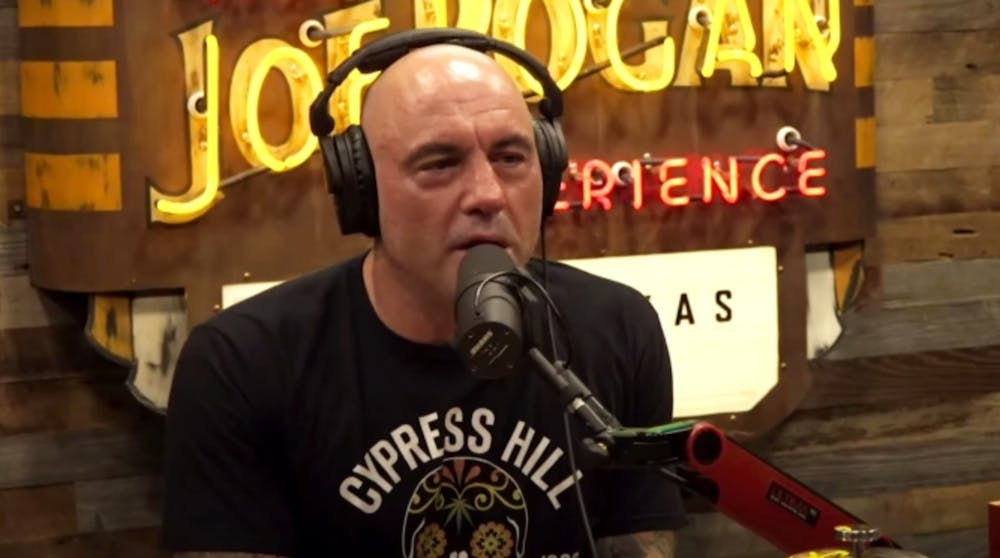Last Friday, fans of longform conversation podcast “The Joe Rogan Experience” opened their Spotify apps to a surprise: entire days’ worth of Joe Rogan content had disappeared.
More than 100 episodes, many featuring right-wing conspiracy theorists like Alex Jones and Milo Yiannopoulos, were quietly deleted by Spotify overnight. The removal is the latest development in an ongoing battle between Spotify, Joe Rogan, Neil Young and Joni Mitchell over the role of corporations in stopping the spread of misinformation.
The controversy started back in September 2020, when host Joe Rogan signed a more than $100 million deal with Spotify to make his podcast’s 11-year catalog exclusive to the streaming service. “The Joe Rogan Experience,” ranked as Spotify’s most popular podcast in 2021, features a rotating cast of guests discussing science, politics and pop culture. But Rogan, self-described as having “a love-hate relationship with conspiracies”, has also used his platform to spread misinformation about the 2020 U.S. presidential election and the COVID-19 pandemic. On Dec. 31, more than 270 physicians and science educators cosigned an open letter condemning Rogan’s promotion of anti-vax beliefs and asking Spotify to take action.
Spotify did nothing – until high-profile artists on its platform took notice. Singer-songwriter Neil Young published a letter on his website Jan. 24 asking that his musical catalog be deleted from Spotify. “I am doing this because Spotify is spreading fake information about vaccines – potentially causing death to those who believe the disinformation about them,” wrote Young. “They can have Rogan or Young. Not both.”
It seems Spotify has chosen Rogan. Two days after the publication of Young’s letter, Spotify announced they had begun removing Young’s music. “We regret Neil’s decision to remove his music from Spotify,” they said in a statement, “but hope to welcome him back again soon.”
Other artists, most notably Joni Mitchell, have since followed Young’s lead, asking that their music be taken off of Spotify in protest as well. The controversy raises a host of questions: is Spotify implicitly endorsing Rogan’s views by hosting his podcast as a Spotify exclusive? What is more important: a corporation’s duty to protect free speech, or its duty to stop the spread of misinformation?
Duke students’ opinions on the #DeleteSpotify controversy are mixed. Some believe that the ideas Joe Rogan platforms on his show are too dangerous and incendiary to be worthy of protection. “Everyone’s entitled to their political opinions, but if those political opinions affect public health and the way people cope with COVID and other diseases, it’s not okay to support things that aren’t based in fact,” said freshman Priyanshi Ahuja. “If your opinions aren’t affecting others, then do whatever you want – but that changes when you’re actively harming other people.”
Others think that censoring those views would be an unethical violation of freedom of speech. “I don’t blame Spotify for siding with Joe Rogan,” said freshman Mick Tobin. “I understand their perspective: wanting to balance free speech with censorship. You want to try and be responsible in how you enforce things, but at the same time, you’re in a delicate position, because the only two main platforms in the industry are you and Apple Music. If Spotify censors one thing, they set a precedent for the future where if Spotify doesn’t like something, they can take it down, no questions asked. We have to err on the side of caution.”
So did Spotify make the right decision? “On the ethical side, it was wrong of them,” freshman Josh Helguera wrote, but “as a business, I believe this was in their better interest.” According to Helguera, the question of whether to remove Joe Rogan from Spotify was an economic dilemma, not a moral one. “People go out of their way to watch podcasts such as Joe Rogan, yet with Joni Mitchell and Neil Young, they are probably just in a playlist made from an assortment of artists. (…) Companies know that if they stop giving content to the people that like hearing Joe Rogan’s podcast, it’ll just cost them money.”
Freshman Rachel Weissman agreed, adding that because “The Joe Rogan Experience” isn’t the first right-wing podcast Spotify has platformed, it shouldn’t be given special condemnation just because it is popular. “I don’t think that Spotify should be politicized,” she said. “I don’t know if Neil Young and Joni Mitchell were right to expect Spotify to align with them politically, because Spotify has a lot of other deals with podcasts that don’t lean exclusively left. They represent political views all across the spectrum.”
Even so, some students said the controversy will change how they interact with Spotify going forward. “I used to blindly trust whatever Spotify said was verified,” said Ahuja. “There’s a sort of ethos when it comes to big corporations’ decisions, because you assume they’re thinking about how people will be affected, since they have such an influential hold on society. But Spotify doing something like this makes me trust them less. It makes me reevaluate how corporations produce and propagate information.”
Get The Chronicle straight to your inbox
Signup for our weekly newsletter. Cancel at any time.

